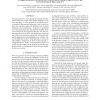Free Online Productivity Tools
i2Speak
i2Symbol
i2OCR
iTex2Img
iWeb2Print
iWeb2Shot
i2Type
iPdf2Split
iPdf2Merge
i2Bopomofo
i2Arabic
i2Style
i2Image
i2PDF
iLatex2Rtf
Sci2ools
FPL
2009
Springer
2009
Springer
Coarse-grained dynamically reconfigurable architecture with flexible reliability
This paper proposes a coarse-grained dynamically reconfigurable architecture, which offers flexible reliability to soft errors and aging. A notion of cluster is introduced as a basic element of the proposed architecture, each of which can select four operation modes with different levels of spatial redundancy and area-efficiency. Evaluation of permanent error rates demonstrates that four different reliability levels can be achieved by the proposed architecture. We also evaluate aging effect due to NBTI, and illustrate that alternating active cells with resting ones periodically will greatly mitigate the aging process with negligible power overhead. The area of additional circuits to attain immunity to soft errors and reliability configuration is 26.6% of the proposed reconfigurable device. Finally, a fault-tolerance evaluation of Viterbi decoder mapped on the proposed architecture suggests that there is a considerable trade-off between reliability and area overhead.
| Added | 24 Jul 2010 |
| Updated | 24 Jul 2010 |
| Type | Conference |
| Year | 2009 |
| Where | FPL |
| Authors | Dawood Alnajiar, Younghun Ko, Takashi Imagawa, Hiroaki Konoura, Masayuki Hiromoto, Yukio Mitsuyama, Masanori Hashimoto, Hiroyuki Ochi, Takao Onoye |
Comments (0)

